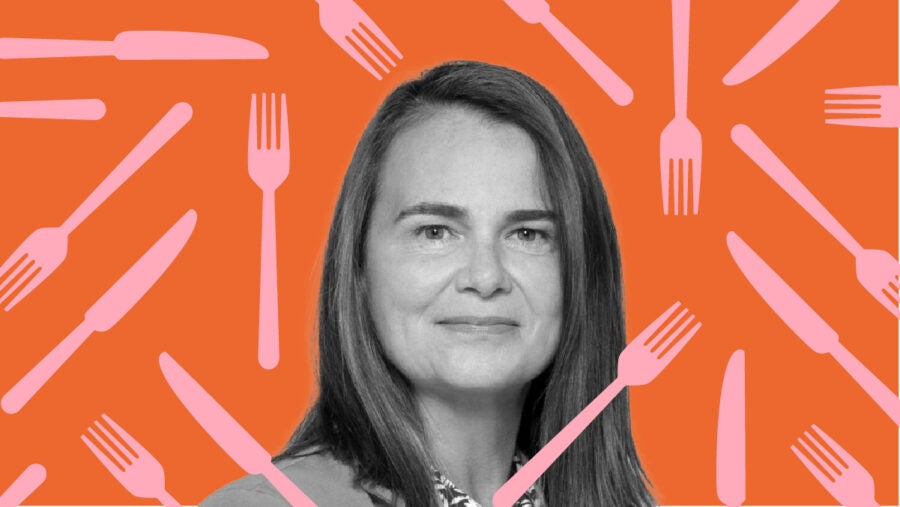
The Just Eat brand might be just as well known for its celebrity collaborations – from Snoop Dogg rapping about eating sushi in his crib to Katy Perry singing for “curry in a hurry” – as it is for its meal-delivery services.
In fact, its commercials and jingle are so distinctive that 70% of UK consumers associate the phrase “did somebody say” with Just Eat.
“Our sonic logo has become a very distinctive asset,” says Susan O’Brien, the firm’s vice-president of global brand. “It’s something we can use on social media, TV or the radio. People recognise it immediately.”
In Just Eat’s latest TV ad, which aired in the UK for the first time on 13 October, rising hip-hop star Latto raps about gyozas while Christina Aguilera ad-libs in an operatic style.
This mash-up of genres was key to the creative proposition, according to O’Brien – something that brands should keep in mind when coming up with campaign concepts.
“For this ad, it was one of reappraisal,” she explains. “We wanted to break any preconception that we don’t have certain types of high-quality cuisine or grocery options on the platform, while tapping into gen Y and gen Z audiences at the same time.”
Just Eat chose Aguilera to appeal to millennials and Latto to engage the zoomers – a decision that created challenges, as O’Brien recalls.
“Two artists means two sets of legal teams, two stylists and two sets of wardrobes,” she says. ”I like to keep it complicated for myself.”
The role of celebrity in creating a memorable ad
Marketing agency McCann London, which had worked on Just Eat’s previous commercials, was the creative force behind the new ad. But the two musicians were also treated as key partners in the process.
We’ve been able to build credibility in this space because we have let the artists stay true to themselves
O’Brien claims that there had been a “massive collaboration” with Perry to ensure that she “felt comfortable with the lyrics” in last year’s advert, adding that the same applied to Latto and Aguilera.
“They interrogated the lyrics to ensure that they could deliver them authentically. They weren’t going to agree to do something completely naff,” she says. “We’ve been able to build credibility in this space because we have let the artists stay true to themselves.”
But there still has to be room for the whimsical style that viewers have come to expect from Just Eat’s commercials. For instance, Aguilera warbles the phrase “sticky icky” in the new ad, which is meant to be “a bit tongue-in-cheek. We still want to keep things playful, because that’s part of our tone of voice,” O’Brien says. “If we can get a wry smile out of the talent and our consumers, that’s a win for us.”
How much does Just Eat spend on its ad campaigns?
One question that inevitably arises when a campaign of this nature emerges is: how much did it cost? Media estimates of what Snoop Dogg was paid vary considerably, with some sources speculating that he received more than £5m. O’Brien wants to put some of these rumours to rest.
“People always think that our marketing budget is huge or that we must spend a fortune on our ads. But you shouldn’t believe everything you read. The amount quoted for Snoop was far too high, for instance,” she says, while remaining coy about the true figure.
It was a surprise how big it became. I’d love to say it was all strategic, but I didn’t have a crystal ball
O’Brien is keen to stress that each campaign is translated into several languages and used in 20 markets, justifying the outlay.
“We squeeze the value out of it,” she says. “We’d never be able to create 20 separate ads of the same quality for each market. That wouldn’t make financial sense and there’s no way that my CFO would approve it.”
Just Eat, which is Europe’s largest meal-delivery company, bases the investment it makes in each campaign on a range of metrics relating to brand recognition. These include “social sentiment, top-of-mind awareness and organic reach”, says O’Brien, who adds: “Shareability has great value as well. We’d have needed to spend many millions on bought views to equal the organic reach achieved by the Katy Perry campaign.”
The signs for the latest one are already positive. Comparing the days before and after the new commercial’s first screening, Just Eat’s ad awareness score increased from 29.2 to 34.9, according to YouGov BrandIndex. Meanwhile, the brand’s score for word-of-mouth exposure shot up from 4.3 to 8.3.
O’Brien admits that the reach of these campaigns has far exceeded her initial expectations. The Snoop Dogg ad, for instance, was viewed more than 4 million times in its first three days.
“It was a surprise how big it became. I’d love to say it was all strategic, but I didn’t have a crystal ball,” she says. “You want to create something that gets people talking. You want to enter their cultural conversations – that’s marketing‘s holy grail.”
Why Just Eat has stuck to its strategy
Although the “did somebody say” campaign has been running since before the Snoop Dogg ad first aired in 2020, O’Brien sees no reason yet to deviate significantly from its current approach.
“As marketers, we tend to love the next shiny thing. We’re always chasing the new,” she says. “But Just Eat has found a winning formula, so we must stay confident, hold our nerve and keep building on it.”
The key to the campaign’s success has been its use of music and high-profile artists, according to O’Brien, who says: “We’ve tapped into the fact that music is a universal language. It transcends generations, classes, cultures – that’s the beauty of it.”
She would advise any other brand seeking to emulate Just Eat’s marketing success to stay close to its customers. By this, she means “listening to their experiences with your brand – the good, the bad and the ugly – and sharing that information with every department in your business”.
For Just Eat, which has its international HQ in the Netherlands, this has meant getting out of the Amsterdam-London “bubble” and speaking to customers in all of its markets. This “keeps you honest and true to what you’re doing”, O’Brien says.
Even though the firm’s annual revenue has risen from just over €2bn (£1.7bn) in 2020 to €5.6bn, it had to take cost-cutting measures this year to offset a decline in total orders. O’Brien will no doubt be hoping that its shiny new campaign will push that number right back up the charts.

The Just Eat brand might be just as well known for its celebrity collaborations – from Snoop Dogg rapping about eating sushi in his crib to Katy Perry singing for “curry in a hurry” – as it is for its meal-delivery services.
In fact, its commercials and jingle are so distinctive that 70% of UK consumers associate the phrase “did somebody say” with Just Eat.
“Our sonic logo has become a very distinctive asset,” says Susan O’Brien, the firm’s vice-president of global brand. “It’s something we can use on social media, TV or the radio. People recognise it immediately.”





